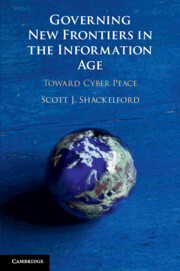Book contents
- Governing New Frontiers in the Information Age
- Governing New Frontiers in the Information Age
- Copyright page
- Dedication
- Epigraph
- Contents
- Figures
- Tables
- Foreword
- Preface
- Acknowledgments
- Abbreviations
- Part I Understanding Cybersecurity and Other Collective Action Challenges in the Information Age
- 1 Governance at the Frontiers of International Relations
- 2 Managing Cyber Attacks as a Global Collective Action Problem
- Part II Security and Environmental Threats Facing the Frontiers: Case Studies in Commons Management and their Application to Cybersecurity and Internet Governance
- Part III Governing New Frontiers in the Information Age
- Conclusion
- Book part
- Index
1 - Governance at the Frontiers of International Relations
Definitions and Assumptions
from Part I - Understanding Cybersecurity and Other Collective Action Challenges in the Information Age
Published online by Cambridge University Press: 13 March 2020
- Governing New Frontiers in the Information Age
- Governing New Frontiers in the Information Age
- Copyright page
- Dedication
- Epigraph
- Contents
- Figures
- Tables
- Foreword
- Preface
- Acknowledgments
- Abbreviations
- Part I Understanding Cybersecurity and Other Collective Action Challenges in the Information Age
- 1 Governance at the Frontiers of International Relations
- 2 Managing Cyber Attacks as a Global Collective Action Problem
- Part II Security and Environmental Threats Facing the Frontiers: Case Studies in Commons Management and their Application to Cybersecurity and Internet Governance
- Part III Governing New Frontiers in the Information Age
- Conclusion
- Book part
- Index
Summary
This chapter introduces the governance of the frontiers, with a special focus on cybersecurity and Internet governance, by first exploring the application of commons principles to these unique environments. This examination begins by defining key concepts such as “commons,” “pseudo commons,” “public goods,” “club goods,” and “common-pool resources,” before moving on to analyze commons governance through the lens of the economics, political science, and legal literatures. Specifically, the chapter discusses the applicability of law and economics concepts such as property rights, use rights, and transaction costs to the traditional global commons (including the deep seabed, Antarctica, outer space, and the atmosphere) as well as to cyberspace. The evolution of sovereignty in these areas is also summarized with a particular emphasis on how cyberspace is distinct from other commons spaces and what that portends for management. Finally, the field of polycentric institutional analysis is introduced along with its application to cyberspace. It is the purview of Chapter 1 to provide an introduction both to the primary characteristics involved in the governance of the managed and unmanaged global commons and to how these concepts apply (and do not apply) to cyberspace.
Keywords
- Type
- Chapter
- Information
- Governing New Frontiers in the Information AgeToward Cyber Peace, pp. 3 - 86Publisher: Cambridge University PressPrint publication year: 2020
- 1
- Cited by

